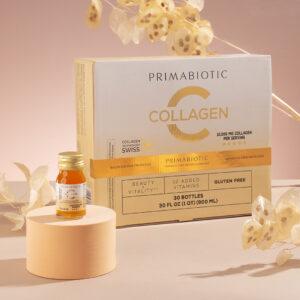
Collagen – what is it and why do we need it?
What exactly is collagen and why is it essential for our well-being? Collagen, often discussed these days, stands as the foremost protein in our bodies, serving as a crucial component in skin, tendons, cartilage, blood vessels, bones, and teeth. Its scarcity can lead to various issues. Within this discourse, we will delve into the significance of collagen, unraveling its pivotal role in both health and beauty.
Protein of youth and the foundation for the skin
Often dubbed as the “protein of youth” and the cornerstone of skin health, collagen holds immense importance for our bodily functions. It facilitates optimal skin hydration, cell renewal, and provides structural support to internal organs and tissues, ensuring their resilience against stretching.
Contrary to common perception, collagen isn’t a singular protein entity; it comprises multiple types. Type I collagen, the most prevalent, is abundant in skin, tendons, and bones, whereas type II collagen is predominantly found in cartilage.
The notion that aging-related skin issues or declining well-being are inevitable misconstrues reality. While we may not halt the onset of wrinkles or discomfort entirely, we can exert considerable influence over them, such as through collagen supplementation. Until approximately the age of 26, our bodies produce collagen at a rate of around 3 kg annually, primarily for replacement purposes—the old collagen is continually replaced with new. However, complications arise later in life when this production declines.
What transpires in our bodies when collagen levels dwindle?
A deficit not only manifests in our physical appearance but also impacts our emotional state. Outwardly, the skin loses its firmness and elasticity, leading to increased wrinkles or facial discoloration, and the emergence of cellulite, even among slender individuals. Hair may become lackluster and brittle, while nails weaken.
The inadequacy of collagen also gives rise to osteoarticular issues. Difficulty keeping up with grandchildren or experiencing discomfort in the shoulders or wrists after routine tasks could signal a collagen deficiency.
Collagen – in liquid or tablet form?
The debate surrounding collagen supplementation often centers on whether to opt for tablets or liquid formulations. Some advocate for the consumption of meat jellies, or “auszpiks,” over supplements. Which approach holds merit?
The absorption of collagen hinges on its hydrolysis, wherein it breaks down into individual amino acids. These amino acids are absorbed at an efficiency rate of about 95% in the intestines and distributed throughout the body. Therefore, for an effective collagen supplement, the hydrolyzed variant is recommended.
As for pork jelly enthusiasts, there’s good news: experts generally regard them as a wholesome delicacy worthy of inclusion in one’s diet. However, solely relying on dietary sources to address collagen deficiency proves challenging—it would necessitate consuming meat jellies almost daily, which isn’t practical. Thus, incorporating meat jellies into the diet alongside supplements is advisable.
